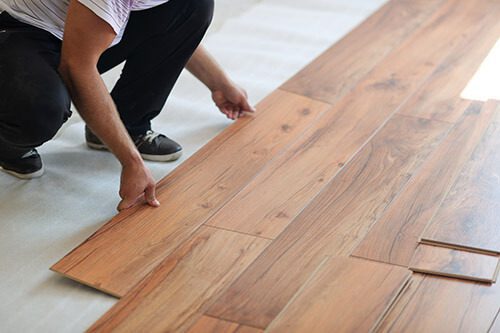FAQs
FAQs (Frequently Asked Questions)
Why choose hardwood floors?
HEALTH BENEFITS
According to the Environmental Protection Agency, “indoor air pollution is one risk that you can do something about” and added that it is one top health threats. Wood floors can contribute to a healthy living environment since hard surface flooring, such as hardwood, does not trap or harbor dust mites, or mold which could cause respiratory health issues like allergies and asthma.
ENVIRONMENTAL FACTOR
Since wood is a natural resource, unlike most floor coverings, and sustainable. Long gone are the days when the trees were cut down with little thought for the long term consequences for the future of our world today. Most timber is cut from forests that are carefully managed to ensure continued resources in the future. Recent studies found almost twice as much timber is added every year than is harvested. In addition there is more standing hardwood timber today than there was 50 years ago.
VARIETY
Wood floors have come a long way in the past few years. Today there are more styles of species of wood flooring than ever before. Whether you are looking for traditional pine, exotic Weng? wood or trendy bamboo-you can be sure to find a color or style to fit your taste.
MAINTENANCE
With today’s advances in wood flooring stealing and finishes, cleaning your hardwood floor has never been easier. Regular maintenance requires little more than sweeping with a micro fiber mop and when necessary, a light hardwood floor cleaner for those tough spills.
WARMTH
Wood floor is cozy and intimate, it fills your home with the warm spirit of wood.
AFFORDABILITY
Beautiful wood flooring does not cost much more than a quality carpet. However, it is cost effective on the long run. Unlike carpet, wood flooring lasts for years, in addition, wood flooring could increase your house value and encourage buyers to make offers.
ENGINEERED WOOD
Engineered Wood Flooring is real Wood from top to bottom, it is not laminate. Laminate is melamine-infused paper on top, wood chip composite on bottom. There are many species of engineered wood flooring such as Hickory, Oak, Maple and much more. Most engineered wood comes with a top finished layer from the manufacturer, which means that it is already sanded and sealed and you could walk on as soon as the floor has been laid.
What is the difference between “ceramic,” “porcelain”?
Ceramic tiles are the standard tiles and are usually made from red clay baked on high temperature with a glaze on the top. The only part of a ceramic tile that is waterproof or stains proof is the top where the glaze is.
Porcelain uses finer clay with smaller particles, compressed at high pressure squeezing more material into the same space. It is then baked at a higher temperature than ceramic therefore the entire body of porcelain tile resists water and stains and can be used outdoors, but cannot install ceramic outdoors.
Does tile chip and crack? Tile can be very fragile product prior to installation, but once it is installed, it becomes part of your construction and will not chip or crack unless hit with a heavy object or natural disasters such as earthquakes. It is very durable and should last a lifetime if it’s installed correctly and maintained properly.
What types of natural stone are there?
The basic types of natural stones are travertine, marble, granite and slate. Any of these can take a lot of abuse and last many years. However, Marble, travertine takes a little more maintenance and care. Your lifestyle and your own home design will determine which fits your house.
Do natural stones require sealing?
All stones need to be sealed. Marble, travertine, and other types of soft stone must be kept well sealed or they may stain. It is recommended to apply a sealer that is made for natural stone. Granite, on the other hand is extremely hard and naturally resistant to stains.
Note that most stones such as marble, granite and some travertine and even slate could be polished by the manufacture but are still porous and subject to staining. We recommend them to be sealed with a penetrating sealer.
Are certain stones more practical to use as kitchen counters than others?
We suggest Granite because its ability to stand acid among heat and other abuses. Lemon is a citric acid that will not harm granite. However if it’s applied to marble, or travertine, for an example, the stone starts to dissolve immediately, and heat could also damage marble and travertine.
If my stone has a polished (shiny) finish, does it still need to be sealed?
Most marble, granite and some travertine and even slate is available with a factory polished finish. These polished stones are still porous, subject to staining, and should be sealed with a penetrating-type sealer.
Helpful Tips
"OUR ONLY MISSION AS A COMPANY, IS TO PROVIDE THE HIGHEST LEVEL OF CUSTOMER EXPERIENCE."
Call East Plano (469) 666-4531, West Plano (469) 666-4530, or Frisco (469) 666-4532 and get the latest flooring designs from the best flooring company.
WEST PLANO LOCATION
Nadine Floor Company
2300 Coit Rd Suite 200
Plano, Texas 75075
(469) 666-4530
Customer Service
EAST PLANO LOCATION
Nadine Floor Company
1105 E Parker Rd Suite 132
Plano, Texas 75074
(469) 666-4531
Customer Service
FRISCO LOCATION
Nadine Floor Company
2930 Preston Rd Suite 950
Frisco, Texas 75034
(469) 666-4532
Customer Service





